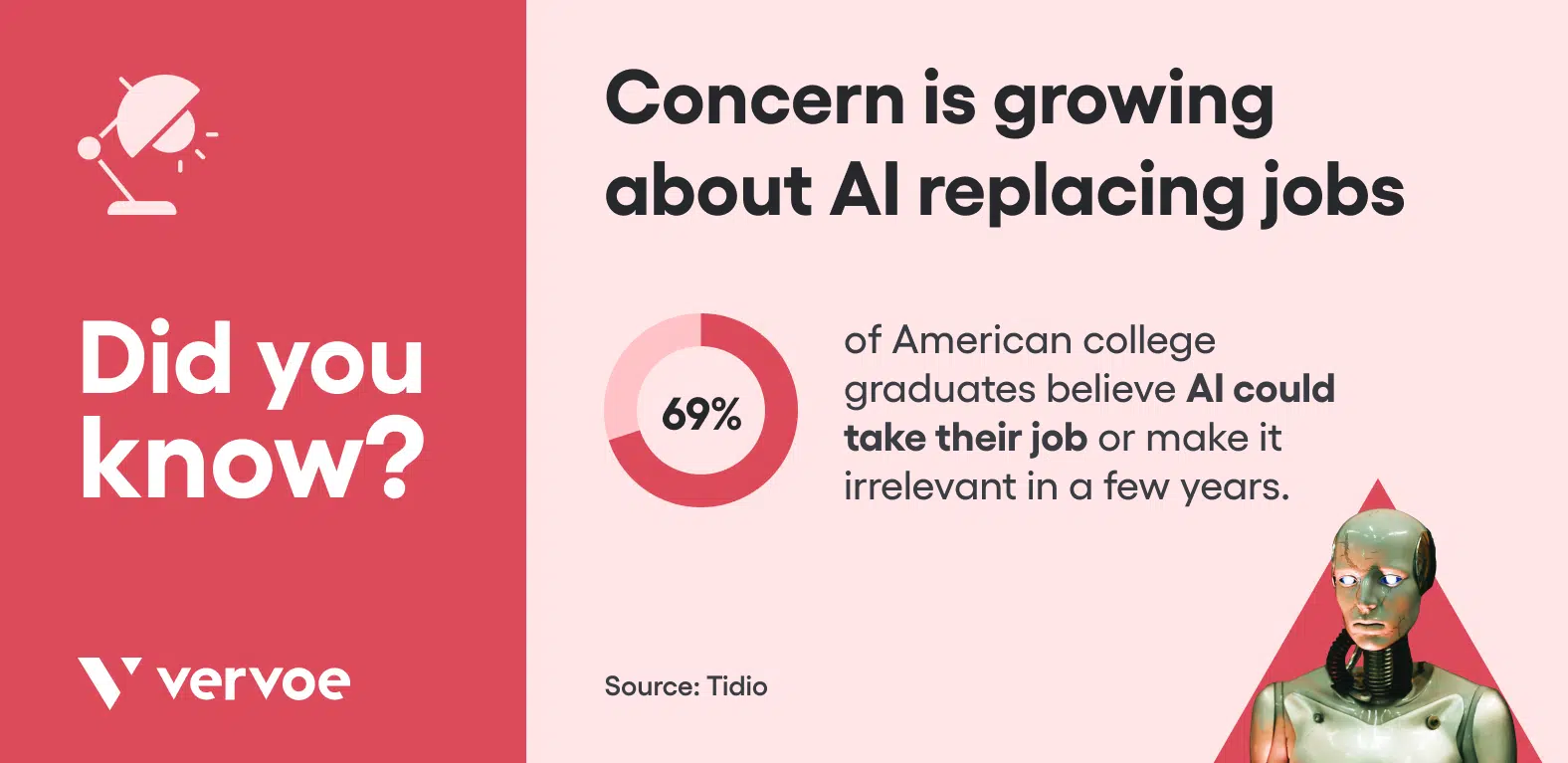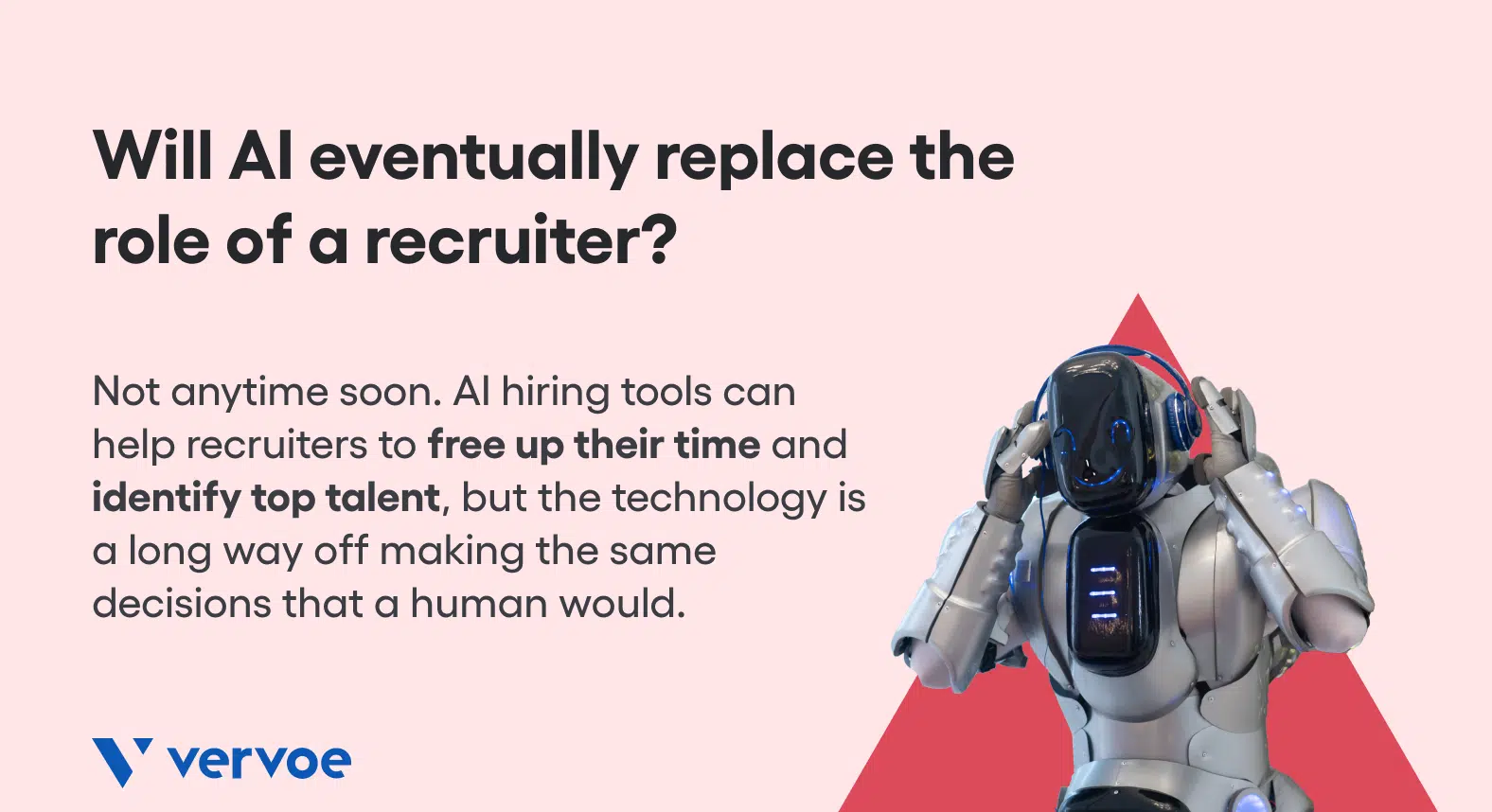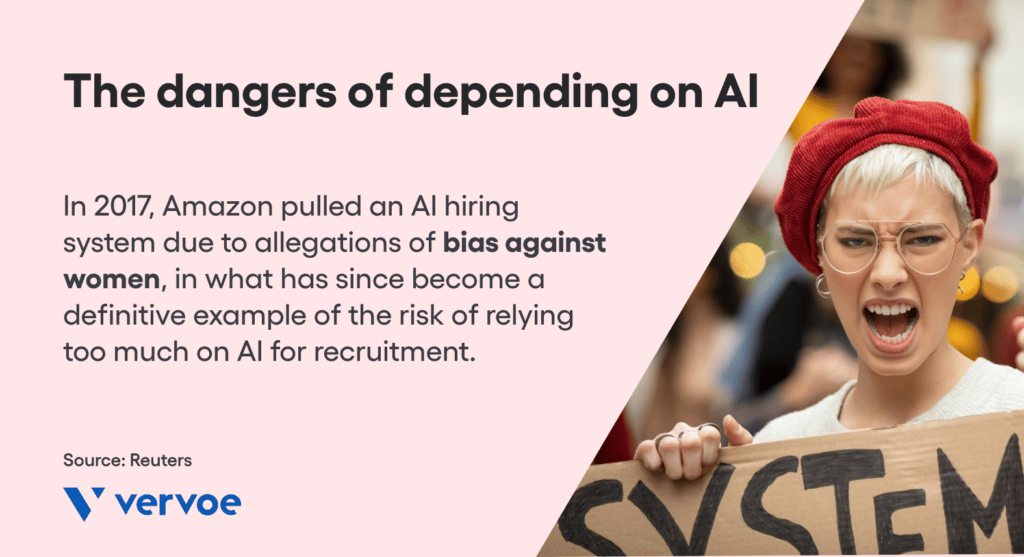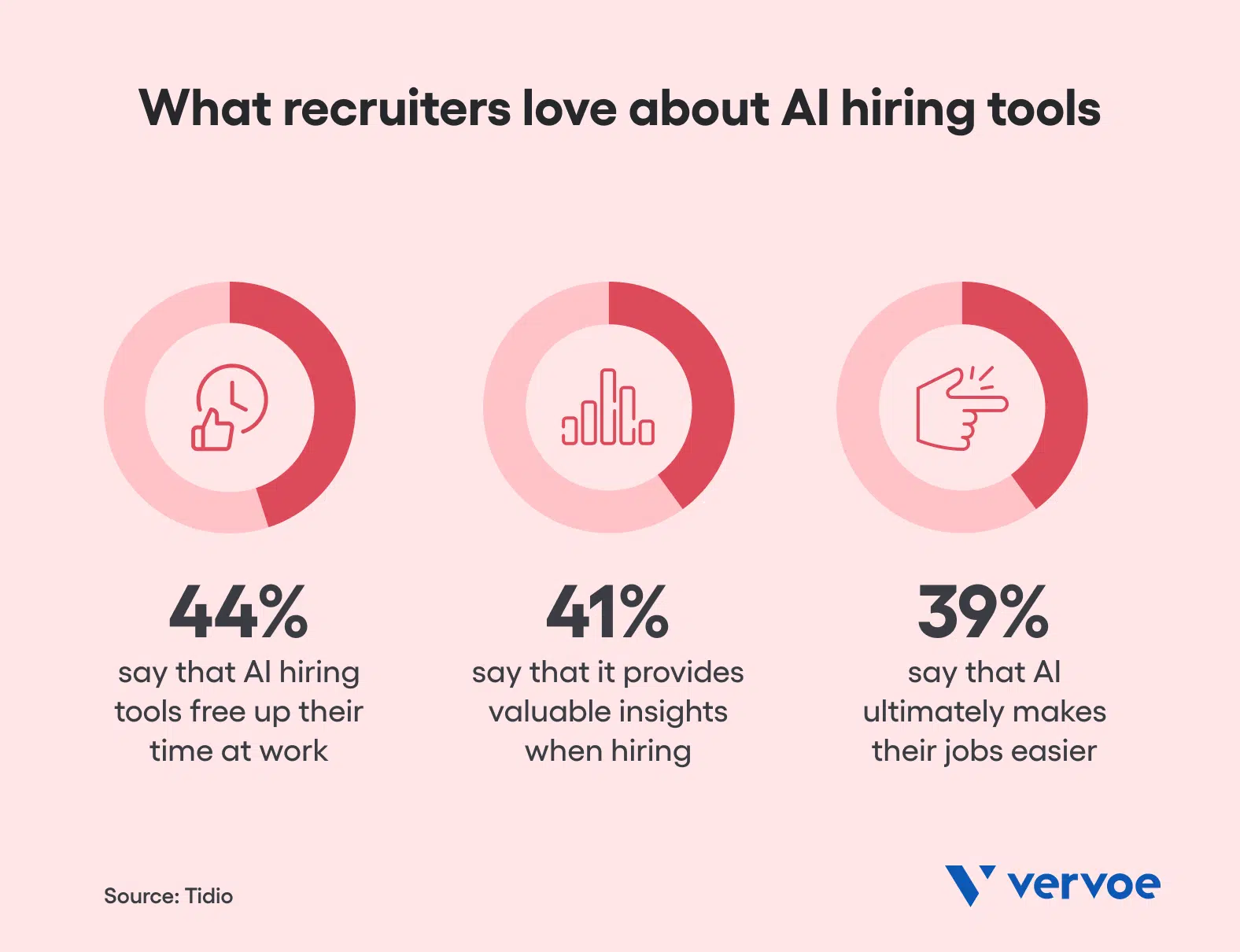With the rise of AI hiring tools in recruitment, are you worried that this technology will replace your role? It won’t happen anytime soon, and here’s why.
Although it’s only February, 2023 feels like it could be the year that artificial intelligence finally takes over the world. As we have seen with the rapid advancement of tools like ChatGPT, the field is rapidly evolving and whether we like it or not, advancements are made at breakneck speeds.
In the not so distant future, AI is expected to play a greater role in automating tasks and processes in various sectors, leading to increased efficiency and productivity. Given its prolific usage across a wide range of industries, such as healthcare, manufacturing and recruitment, it should come as no surprise that a growing number of people are concerned about AI taking over jobs – or more specifically, their jobs.
According to a widely-commented study on the future of employment, now known as the Oxford Study, about 47% of total US employment is at risk due to rapid computerization. While this figure includes robotics as well as artificial intelligence, it’s easy to see why almost 69% of college graduates in the United States believe AI could take their job or make it irrelevant in a few years.
Despite this, it’s not all gloom and doom. While predicting what jobs will AI replace in the future isn’t always easy to anticipate, there’s one sector where a machine will never be able to fully replicate the decisions made by a human: recruitment.

Will AI replace recruiters during the hiring process?
The short answer? No. Employers have long dreamed of harnessing technology to widen the hiring net and reduce reliance on the subjective opinions of human recruiters, but computer science experts like Professor Nihar Shah, who teaches machine learning at Carnegie Mellon University, believe that there’s still quite a bit of work to do.
“How to ensure that the algorithm is fair, how to make sure the algorithm is really interpretable and explainable – that’s still quite far off.”
In any scenario, it’s rare for the academics and those in the coal face to agree – but AI limitations for recruitment are surprisingly clear cut. David Weinberg, Co-Founder and Chief Product Officer at Vervoe, spends his days refining the network architecture of skills assessments and job simulations, and agrees that AI taking over jobs in recruitment won’t happen anytime soon.
“Since every organization and every role in an organization is unique, only a recruiter with intimate knowledge of the company, team and role can make the final hiring decision,” David says.
In simple terms, AI helps with agile recruiting solutions. According to David, it won’t wholly replace the role of a hiring manager – who is ultimately responsible for making decisions – but should instead be used as a tool to effectively identify the right people for the right roles.
“Good AI hiring tools can help the recruiter make their decision by surfacing relevant information which would otherwise be unavailable to them. Instead of replacing the recruiter during the decision process, AI hiring tools should also help the recruiter spend more time on the best performers by ranking candidates based on job performance without bias.”
However, before signing up to recruitment platforms that include artificial intelligence, it’s important to be aware of AI limitations if you want to harness this technology to assist you at work and during the hiring process.

An example of the impact of AI on recruitment
To grasp how AI is currently being used in HR and recruitment, one of the largest organizations in the world provides some pretty valuable insights that every company could learn from.
In November 2022, Amazon offered buyouts to its recruiters and were exploring options to replace them with artificial technology software. Of course, it’s also worth noting that this is in addition to the projected thousands of people who will be let go from the giant online retailer, with CEO Andy Jassy indicating that Amazon was looking to eliminate as many as 18,000 roles.
While not all of those predicted layoffs would eventually be replaced with AI technologies, it’s fair to assume that this is the intention for at least a portion of those roles.
According to a confidential internal document viewed by Recode, Amazon has been working on an automated applicant evaluation system designed to identify CVs that match with the profiles of existing employees who are considered star performers, with those candidates then being fast-tracked for interviews.
This isn’t the first time the retail juggernaut has attempted to use AI hiring tools. In fact, Amazon pulled an AI system in 2017 due to allegations of bias against women in what has since become a definitive example of the risk of relying too much on AI for recruitment. While it’s reported that Amazon’s new AI hiring platform is built to ensure that there won’t be prejudices in the hiring process, whether or not this is actually the case remains to be seen.
So is Amazon really moving towards a better recruitment process? Well, it sounds like they haven’t quite learned from their mistakes, and the new process is setting Amazon up for a culture of homogeneity. What’s more, is that resume screening tools have been proven to overlook qualified applicants, with statistics showing that applicant tracking systems eliminate 75% of candidates. In real-world terms, what this means is that one in four resumes submitted are never seen by the human eye.
A company of Amazon’s size is a prime example of the impact of AI on recruitment. High volume hiring – also known as bulk hiring and mass recruitment – refers to the process of recruiting multiple open jobs in a set timeframe, and using AI hiring tools to help are necessary to fill warehouse jobs, delivery drivers, fulfillment center workers, store associates, and many more hourly positions.

Identifying key areas where AI can’t replace the role of a recruiter
Despite the potential benefits of using artificial intelligence to fill a large number of vacant roles, it’s unlikely that those same tools are deployed when recruiting senior or skilled roles, as scanning a resume simply doesn’t provide enough information on whether an applicant would be a good match or not.
Fundamentally, AI hiring tools like applicant tracking systems and resume screening products are only as good as the data elements from which they are built. These systems lack awareness and intuition, and can only work from information provided by the system administrator.
While these types of software may streamline the day-to-day workload of recruiters, AI hiring tools are simply not equipped to fully replace the role of a human during the hiring process.
3 AI hiring tools that every recruiter should embrace
Nearly 67% of HR professionals believe that AI has many benefits, and a positive impact on the recruitment process. People think AI will free up the recruiter’s time (44%), provide valuable insights during the recruitment process (41%), and make the recruiter’s job easier (39%).
Instead of concerning yourself with what jobs will AI replace and how it might affect your career in recruitment, the better concept to explore is: what AI hiring tools are on offer that will make things easier not just for recruiters, but for candidates as well?
Like it or not, there are some outdated recruitment products that tend to give all AI hiring tools a bad name. On average, it takes organizations 42 days to recruit, interview, screen, and hire a new employee – so it’s no surprise that recruiters want access to software that will help to speed the process up. However, using AI in recruitment as a force for good should focus on the philosophy of hiring with confidence, not efficiency.
52% of talent acquisition leaders report that the hardest part of recruitment is identifying the “right” candidates from a large and diverse applicant pool, and is particularly challenging when selecting top candidates for mid-tier, yet highly skilled roles.
The solution? Use AI hiring tools to identify those with the right set of skills, instead of relying on software that has the potential to discriminate based on what the candidate looks like on paper. This way, recruiters can still apply discretion while using artificial intelligence to simplify the hiring process – so what are your options?
1. Job simulations
Sometimes, standard skills assessments aren’t enough to validate the claims of a candidate. As an example, it would be nearly impossible to tell if a copywriter could produce content on a multiple-choice questionnaire, or verify that a cybersecurity expert could build firewalls through a three-minute video response. The solution? Job simulations, which essentially take skills testing to a whole new level.
As the name would suggest, an authentic job simulation is as close as an applicant will get to a real day in your workplace. In the same environment, with the same requirements and armed with the same resources, a candidate will have the chance to truly experience what working for a particular organization is like via a simulation, while the hiring manager can assess their capabilities fairly, efficiently, and without bias.
2. Skills assessments
Skills assessments are an incredibly powerful tool that can improve the speed, efficiency, and fairness of any hiring process when it’s equipped with the right AI data set. They have the potential to ease the stress of hiring in high volumes, and empower recruiters with the information that they need to identify applicants equipped with the right hard and soft skills to succeed in a role.
As no two roles are ever quite the same, no two skills assessments should be either. For skills assessment best practices include a minimum of six diverse questions, but somewhere in the eight to 10 range is best. Not only will this better gauge their talents and let the AI validate their skills appropriately, but it also helps with candidate engagement and leads to high rates of completion.
3. Certsy skills verifications
In a recent survey, 71% of job seekers told SEEK — one of the world’s most popular job boards — that, at some point, they stretched the truth or outright lied on their resumes. Enter, Certsy: a secure and trusted platform designed by SEEK for hiring managers to verify work credentials, for candidates to complete compliance checks, and now even complete AI-powered skills assessments to showcase their talents.
From degrees to driver’s licenses, Certsy prompts users to upload relevant documents or evidence to its platform, and independently verifies those claims. Once this certification is complete, the claims appear on the user’s SEEK profile accompanied by a purple “super tick”, helping them stand out in a feed of applicants and catch the eyes of hiring managers. It’s particularly helpful for verifying skills such as MYOB or Excel.
Identifying AI hiring platforms that truly aid recruitment tasks
Ideally, AI-powered hiring tools should solve more problems than they create. Too often, products that include this type of technology either include subconscious bias from being fed the wrong types of data (such as grading candidates on their name, education, or even gender), while others are simply programmed with a “set and forget” mindset.
To prevent this from occurring at Vervoe, we started with a clean dataset that we built up over a two-year period with real candidates applying for real jobs being graded by real employers. Today, that data set continues to grow, and any human-induced bias from real-world data is flagged and rectified.
Ultimately, changing to a better recruitment process is not synonymous with AI, and nor will this technology fully replicate – or replace – the role of a human. Our AI powered platforms are only as good as we make them, and recruitment products that include artificial intelligence should only ever be used with a human overseeing it.
At Vervoe, it’s for this reason that our AI hiring tools will only ever enhance the role of a recruiter, and not replace them.

How Vervoe is reinventing AI hiring tools
Vervoe is an end-to-end AI-powered solution that is proudly revolutionizing the hiring process through skills testing, job simulations, and machine learning recruitment. By empowering businesses to create tailored assessments designed to suit the specific requirements of a role, Vervoe predicts performance using job simulations that showcase the talent of every candidate.
By assessing an applicant’s ability to perform the role through a skills assessment, our AI-powered job simulations focus on the work — and not the person. To see people do the job before they get the job, book a demo today and let our experienced team run you through Vervoe’s full range of ready-made and tailored solutions.


















